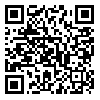Volume 28 - Supplementary
IBJ 2024, 28 - Supplementary: 51-51 |
Back to browse issues page
Download citation:
BibTeX | RIS | EndNote | Medlars | ProCite | Reference Manager | RefWorks
Send citation to:



BibTeX | RIS | EndNote | Medlars | ProCite | Reference Manager | RefWorks
Send citation to:
Rigi M, Pishkar Mofrad Z, Navidian A, Nosratzehi S, Fallah Karimi S. Effect of Mobile Health-Based Training on the Knowledge, Health Literacy of Hypothyroid Patients in 2023. IBJ 2024; 28 :51-51
URL: http://ibj.pasteur.ac.ir/article-1-4427-en.html
URL: http://ibj.pasteur.ac.ir/article-1-4427-en.html
Abstract:
Introduction: Hypothyroidism is a common chronic disease that requires patients to have self-care skills such as maintaining a healthy diet, exercising, and following a daily medication regimen. Many patients need more knowledge and health literacy to manage their condition effectively. Using mobile health-based training applications or software could be beneficial in educating patients. Therefore, this study aimed to determine the impact of mobile health-based training on hypothyroid patients' knowledge and health literacy.
Methods and Materials: In this semi-experimental study, 70 patients referred to the endocrinology clinics of Zahedan University of Medical Sciences in 1402 were selected and randomly assigned to intervention and control groups using available sampling methods and according to the Inclusion criteria. To collect information, we utilized a demographic and disease information form, as well as a health literacy and knowledge questionnaire. The data collection method employed was self-reporting. In addition to the standard training provided by the doctor, patients in the intervention group received a patient-centered management application specially designed for hypothyroidism. It was installed on their mobile phone, and the daily training message was uploaded to the application for one month. Three months after the training, a post-test was conducted on two groups. Data analysis was performed using the chi-square test, independent t-test, and Pearson correlation coefficient in SPSS software version 26.
Results: The two study groups were homogeneous regarding age, gender, marital status, ethnicity, tobacco consumption, education level, job, place of residence, type of hypothyroidism, underlying disease, source of information, and duration of hypothyroidism (p = 0.05). The average score of health literacy in the intervention group ranged from 36.40 ± 5.18 to 38.77 ± 5.18 before and after the intervention, respectively. In the control group, it ranged from 36.2 ± 7.01 before and 38.77 ± 5.18 after the post-test. The average change in health literacy score in the intervention group was 2. 37 ± 2.42, which was significantly more than the control group (-0.11 ± 2.41; p = 0.0001). The independent t-tests showed that the mean knowledge score in the two groups before the intervention did not differ (p = 0.78). However, after the intervention, the mean and standard deviation of the knowledge score of the intervention group patients was significantly higher than the control group (p = 0.0001). Also, the average change of knowledge score in intervention group patients was 9.54 ± 3.16, significantly more than the control group (-0.20 ± 3.93; p = 0.0001).
Conclusion and Discussion: The study emphasized the importance of patients participating in self-care after receiving disease management information via mobile health technologies. Implementing mobile phone-based information is suggested to enhance patients' knowledge and health literacy.
Methods and Materials: In this semi-experimental study, 70 patients referred to the endocrinology clinics of Zahedan University of Medical Sciences in 1402 were selected and randomly assigned to intervention and control groups using available sampling methods and according to the Inclusion criteria. To collect information, we utilized a demographic and disease information form, as well as a health literacy and knowledge questionnaire. The data collection method employed was self-reporting. In addition to the standard training provided by the doctor, patients in the intervention group received a patient-centered management application specially designed for hypothyroidism. It was installed on their mobile phone, and the daily training message was uploaded to the application for one month. Three months after the training, a post-test was conducted on two groups. Data analysis was performed using the chi-square test, independent t-test, and Pearson correlation coefficient in SPSS software version 26.
Results: The two study groups were homogeneous regarding age, gender, marital status, ethnicity, tobacco consumption, education level, job, place of residence, type of hypothyroidism, underlying disease, source of information, and duration of hypothyroidism (p = 0.05). The average score of health literacy in the intervention group ranged from 36.40 ± 5.18 to 38.77 ± 5.18 before and after the intervention, respectively. In the control group, it ranged from 36.2 ± 7.01 before and 38.77 ± 5.18 after the post-test. The average change in health literacy score in the intervention group was 2. 37 ± 2.42, which was significantly more than the control group (-0.11 ± 2.41; p = 0.0001). The independent t-tests showed that the mean knowledge score in the two groups before the intervention did not differ (p = 0.78). However, after the intervention, the mean and standard deviation of the knowledge score of the intervention group patients was significantly higher than the control group (p = 0.0001). Also, the average change of knowledge score in intervention group patients was 9.54 ± 3.16, significantly more than the control group (-0.20 ± 3.93; p = 0.0001).
Conclusion and Discussion: The study emphasized the importance of patients participating in self-care after receiving disease management information via mobile health technologies. Implementing mobile phone-based information is suggested to enhance patients' knowledge and health literacy.

| Rights and permissions | |
 |
This work is licensed under a Creative Commons Attribution-NonCommercial 4.0 International License. |







.png)
